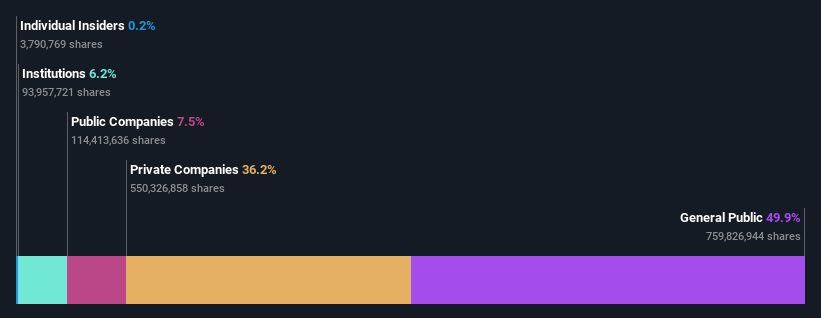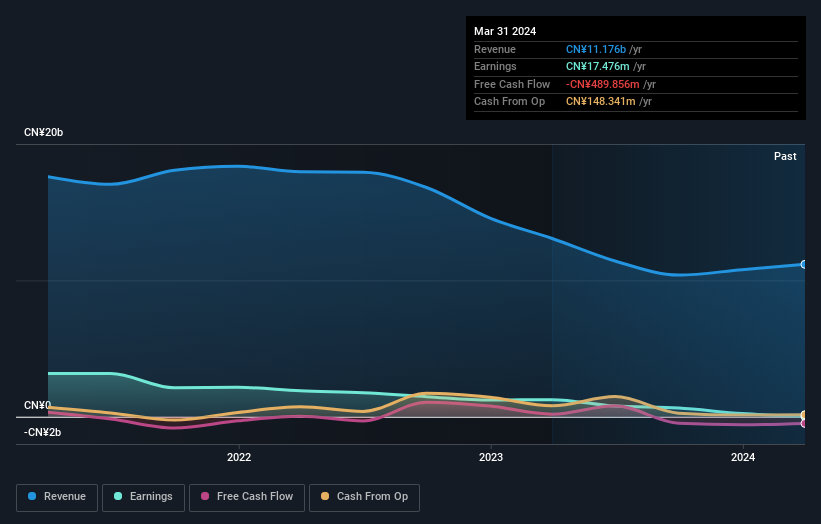- China
- /
- Trade Distributors
- /
- SHSE:600739
Liaoning Cheng Da Co., Ltd.'s (SHSE:600739) market cap surged CN¥761m last week, individual investors who have a lot riding on the company were rewarded

Key Insights
- Significant control over Liaoning Cheng Da by individual investors implies that the general public has more power to influence management and governance-related decisions
- A total of 25 investors have a majority stake in the company with 50% ownership
- Past performance of a company along with ownership data serve to give a strong idea about prospects for a business
A look at the shareholders of Liaoning Cheng Da Co., Ltd. (SHSE:600739) can tell us which group is most powerful. We can see that individual investors own the lion's share in the company with 50% ownership. In other words, the group stands to gain the most (or lose the most) from their investment into the company.
Clearly, individual investors benefitted the most after the company's market cap rose by CN¥761m last week.
Let's take a closer look to see what the different types of shareholders can tell us about Liaoning Cheng Da.
See our latest analysis for Liaoning Cheng Da

What Does The Institutional Ownership Tell Us About Liaoning Cheng Da?
Institutions typically measure themselves against a benchmark when reporting to their own investors, so they often become more enthusiastic about a stock once it's included in a major index. We would expect most companies to have some institutions on the register, especially if they are growing.
As you can see, institutional investors have a fair amount of stake in Liaoning Cheng Da. This can indicate that the company has a certain degree of credibility in the investment community. However, it is best to be wary of relying on the supposed validation that comes with institutional investors. They too, get it wrong sometimes. When multiple institutions own a stock, there's always a risk that they are in a 'crowded trade'. When such a trade goes wrong, multiple parties may compete to sell stock fast. This risk is higher in a company without a history of growth. You can see Liaoning Cheng Da's historic earnings and revenue below, but keep in mind there's always more to the story.

Hedge funds don't have many shares in Liaoning Cheng Da. The company's largest shareholder is Shaoguan Gaoteng Enterprise Management Co., Ltd., with ownership of 15%. With 11% and 8.6% of the shares outstanding respectively, Liaoning Holding (Group) Co., Ltd. and Guangxi Xinyixin Commercial Services Co., Ltd. are the second and third largest shareholders.
Our studies suggest that the top 25 shareholders collectively control less than half of the company's shares, meaning that the company's shares are widely disseminated and there is no dominant shareholder.
Researching institutional ownership is a good way to gauge and filter a stock's expected performance. The same can be achieved by studying analyst sentiments. As far as we can tell there isn't analyst coverage of the company, so it is probably flying under the radar.
Insider Ownership Of Liaoning Cheng Da
The definition of an insider can differ slightly between different countries, but members of the board of directors always count. Management ultimately answers to the board. However, it is not uncommon for managers to be executive board members, especially if they are a founder or the CEO.
Most consider insider ownership a positive because it can indicate the board is well aligned with other shareholders. However, on some occasions too much power is concentrated within this group.
Our information suggests that Liaoning Cheng Da Co., Ltd. insiders own under 1% of the company. But they may have an indirect interest through a corporate structure that we haven't picked up on. Keep in mind that it's a big company, and the insiders own CN¥33m worth of shares. The absolute value might be more important than the proportional share. It is good to see board members owning shares, but it might be worth checking if those insiders have been buying.
General Public Ownership
The general public-- including retail investors -- own 50% stake in the company, and hence can't easily be ignored. While this group can't necessarily call the shots, it can certainly have a real influence on how the company is run.
Private Company Ownership
It seems that Private Companies own 36%, of the Liaoning Cheng Da stock. It might be worth looking deeper into this. If related parties, such as insiders, have an interest in one of these private companies, that should be disclosed in the annual report. Private companies may also have a strategic interest in the company.
Public Company Ownership
Public companies currently own 7.5% of Liaoning Cheng Da stock. This may be a strategic interest and the two companies may have related business interests. It could be that they have de-merged. This holding is probably worth investigating further.
Next Steps:
I find it very interesting to look at who exactly owns a company. But to truly gain insight, we need to consider other information, too. For instance, we've identified 4 warning signs for Liaoning Cheng Da (2 are a bit concerning) that you should be aware of.
Of course this may not be the best stock to buy. So take a peek at this free free list of interesting companies.
NB: Figures in this article are calculated using data from the last twelve months, which refer to the 12-month period ending on the last date of the month the financial statement is dated. This may not be consistent with full year annual report figures.
New: AI Stock Screener & Alerts
Our new AI Stock Screener scans the market every day to uncover opportunities.
• Dividend Powerhouses (3%+ Yield)
• Undervalued Small Caps with Insider Buying
• High growth Tech and AI Companies
Or build your own from over 50 metrics.
Have feedback on this article? Concerned about the content? Get in touch with us directly. Alternatively, email editorial-team (at) simplywallst.com.
This article by Simply Wall St is general in nature. We provide commentary based on historical data and analyst forecasts only using an unbiased methodology and our articles are not intended to be financial advice. It does not constitute a recommendation to buy or sell any stock, and does not take account of your objectives, or your financial situation. We aim to bring you long-term focused analysis driven by fundamental data. Note that our analysis may not factor in the latest price-sensitive company announcements or qualitative material. Simply Wall St has no position in any stocks mentioned.
Have feedback on this article? Concerned about the content? Get in touch with us directly. Alternatively, email editorial-team@simplywallst.com
About SHSE:600739
Liaoning Cheng Da
Engages in supply chain trade, biopharmaceuticals, financial investment, energy development, and other businesses in China and internationally.
Slight with mediocre balance sheet.

